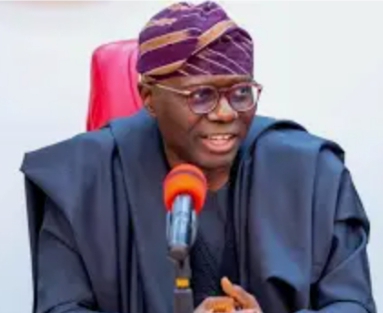Business Focus
Gov. Sanwo-Olu Renews Call for Resource Control
Published
2 years agoon

BY EGUONO ODJEGBA

The Governor of Lagos State, Babajide Sanwo-Olu has stirred the hornets nest as he raised the issue of resource control, noting that there’s compelling need to decentralize the exploitation of mineral resources in the country, with states active participation as joint stakeholders.
Governor Sanwo-Olu who made the call Monday in Lagos at the opening ceremony of the Nigeria Extractive Industries Transparency Initiative (NEITI) 2024 Board Meeting/Retreat argued that
for Nigeria to fully harness its abundant natural resources, there is an urgent need to re-examine existing laws that vest control of exploration and production of oil and other mineral resources in the Federal Government.
The Governor who was represented at the event by the Lagos State Commissioner for Energy, Biodun Ogunleye urged the federal government to begin serious evaluation of the existing laws and open up the sector for inclusive critical participation.
His words, “The need for review of these laws has become very urgent if the Federal Government’s policy on Ease of Doing Business is to succeed especially at the sub-national levels. The review is also important to promote investments in the extractive industry and diversify our nation’s economy.
“To this end, the Federal Government and its agencies need to engage more with the private sector and sub-national governments in the development of our natural resources.
“The areas of engagement include solid minerals development, host community programmes, environmental sustainability, energy efficiency, domestic resource mobilisation and poverty reduction initiatives which are at the centre of realising the impacts of the global extractive industries transparency initiative in resource-rich countries like Nigeria”, he said.
Meanwhile, the Dr Ogbonnaya Orji, NEITI Executive Secretary has revealed that Nigeria lost an estimated $1.84bn worth of petroleum products via the refineries within nine years.
According to Orji, a total of 4.2 billion litres of petroleum products was lost between 2009 and 2018 as a result of oil theft between 2009 and 2018; at 140,000 barrels per day.
The NEITI boss substantiating his claims said, “Figures contained in our 2009 to 2020 audits have put Nigeria’s losses to crude oil theft over a 12-year period at 619.7 million barrels valued at $46.16bn or N16.25tn.
“Similarly, between 2009 and 2018, the country also lost 4.2 billion litres of petroleum products from refineries valued at $1.84 billion.”
He explained that the loses and their attendant negative effects on the economy made the previous administration set up a special panel on oil theft/loses to study the situation.
This is even as Orji hinted that NEITI did a report and made recommendations on the ways to stop oil theft in Nigeria, noting however that the powers that be, failed to act on its report and recommendations.
While urging the President Bola Tinubu government to look into the report and implement NEITI’s recommendations, he remarked that the five-day retreat was an opportunity to brainstorm on how best to deal with the prevailing challenges of oil theft, illegal mining, pipeline and asdociated governance challenges in the sector, leading to the loss of revenues and investment opportunities.
Speaking on global energy transition Orji expressed dismay at Nigeria’s slow pace in catching up with the global shift from fossil fuels to renewable energy, and the reality that Nigeria still depends almost exclusively on crude oil as it’s economic mainstay.
The global transition from fossil fuels to renewable energy sources he said poses significant risks to countries that depend heavily on hydrocarbon-based natural resource revenues for survival.
“Our country, Nigeria is heavily dependent on oil revenues for survival. It is within the ambit of this board to support our government and citizens with timely policy decisions and strategies to deal with this unavoidable unfolding development in the extractive sector.
“The fear of the known risks in most of the affected countries far outweighs the potential unknown opportunities except we utilise the immense opportunities within the Extractive Industries Transparency Initiative, its global network and multi-stakeholder framework to search for solutions.
“At current dependency levels, Nigeria already faces significant threats to its economy from the prospect of a permanent decline in global demand for crude oil. The demand for our oil keeps going down daily,” he enthused.
He proposed a short-long term strategies to tide over the inevitable disruptions caused by the regime of renewable energy on the nation’s economic dynamics.
“While the transition from carbon-based fuel will have a significant long-term impact on Nigeria’s revenue and exports, the transition would also have other impacts on the economy. A direct consequence of the transition would be the loss of fossil fuel as a source of energy.
“In 2021, crude oil and gas accounted for 46 per cent of energy use and 78 per cent of electricity generation in Nigeria. The transition would therefore require significant financial investment for the country to generate renewable energy to replace energy previously generated from carbon fuels. This financing (and technological) burden is in addition to the equally significant amount of money that is required to close Nigeria’s current energy supply gap,” he said.
Continue Reading
Advertisement
You may like
Click to comment
Advertisement



Business Maritime14 hours ago
‘NSW Implementation Expected To Drive Down Port Costs’ — NAGAFF President, Ezisi

Maritime2 days ago
NIMASA, Nigerian Air Force Strengthens Partnership

Business Maritime2 days ago
New Dawn for Nigerian Seafaring: Dr. Okonna’s Factor

Business Focus2 days ago
Dangote Refinery: The Dawn of Liberating Truth

Maritime2 days ago
‘NSLM-MAN Partnership a Redefining Trajectory for Nigeria’s Maritime Training’ – Kehinde

Customs Report4 days ago
Border Revolution: The Afeni Two Months Crackdown

Uncategorized5 days ago
NSML Inducts 30 Maritime Academy Cadets

Business Maritime7 days ago
National Single Window Committee Launches End User Training

Customs Report1 week ago
ANLCA Designate National Secretariat, Onne Zonal Secretariat for Members’ NSW Training

Uncategorized1 week ago
Nigeria Customs Clarifies Exchange Rate Application In Customs Valuation

National1 week ago
The Thallium Sulphate Scandal: Poison Politics or National Security?

Business Maritime1 week ago
Coordinated Governance: Customs Launches Digital One-Stop-Shop

Customs Report5 years ago
ANLCA Board is intact, cannot be wished away by anybody’-Elochukwu

Maritime1 year ago
B-R-E-A-K-I-N-G: Effedua, Rector MAN Oron, Resigns

Features1 year ago
EFCC’s Probe: Okowa Plots Sheriff’s Removal Despite London Accord

Business1 year ago
Customs Trains ANLCA Members, Others on B’Odogwu Portal

Analysis1 year ago
NPA’s Alleged Executive Management Fight: The Half Truth & Truth
Features2 years ago
ANLCA Board Election: Know Your Candidates

Interview1 year ago
‘Why We Launched B-Odogwu Pilot Scheme With Webb Fontaine Still Running’ – Adeniyi

Customs Report12 months ago
Nigeria Customs: Trust, Competence And The Oramalugo Factor

Maritime1 year ago
Onyemekara Promoted GM, Appointed NPA’s New Spokesperson

Uncategorized1 year ago
‘Rush To Break News Can Lead To Brush With Cybercrime’- Police

Customs Report8 months ago
Kebbi Is Hub of Hard Drugs Smuggling In Northern Region’ – Oramalugo

Business Maritime1 year ago
Maritime Industry At 64: Oyetola Versus Oyetola
Advertisement
Enter ad code her




